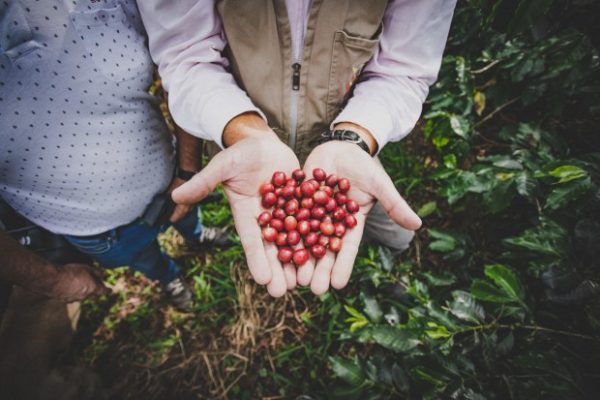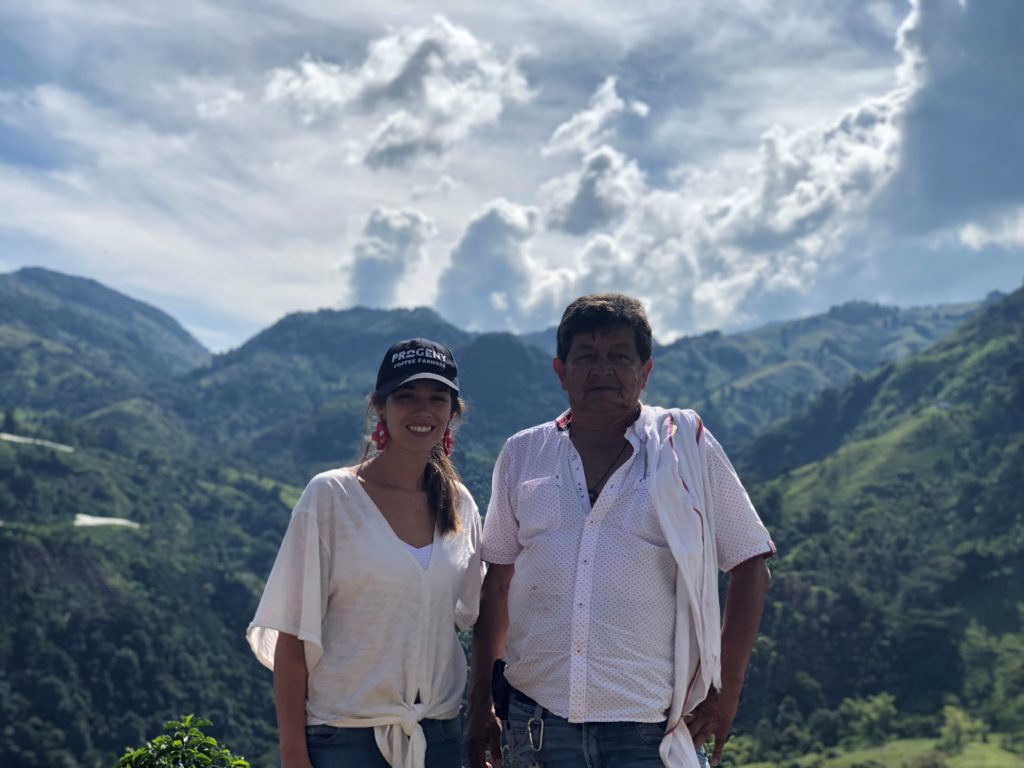When most people in the United States talk about coffee, even rave about coffees they love, they’re almost always talking about the roasters. Third wave coffee ushered in an era where the “single-origin” of a coffee bean, say Ethiopia or Costa Rica, is highlighted on bags, menus, and websites. And it’s usually the roasters who get the credit. You can find an $8 cup of coffee in any city in America, while in Colombia, farmers are stuck in a poverty loop selling their coffees 20% below margin.
Progeny Coffee is on a mission to change that. Progeny was co-founded by Maria Palacio, a 5th generation Colombian coffee farmer, and her husband John Trabelsi, a branding and design expert who built their website.
The daughter and granddaughter of coffee farmers in the Colombian district Quindio, Maria Palacio grew up witnessing the struggles of smallholder coffee farmers. Colombia is synonymous with coffee, but because farmers there are using 100-year-old commercialization methods, they’re barely getting paid and have no control over the price. “We had these farms, but the economy crashed and we started losing the farms and the fields,” Maria told Daily Coffee News. She said she spent most all the weekends of her youth alongside her family picking coffee. “They really tried to tell me, ‘you need to leave, there’s nothing here, you need to get your education and leave.’”
Maria did leave, moving to New York and working in the fashion industry for six years. Surprising everyone, including herself and her family, Maria made the bold move to switch careers and return to coffee, this time bringing with her a wealth of education and experience in the U.S. consumer market. She and her husband John moved to the Bay Area and launched Progeny together.
The company’s mission is to serve as a distribution platform to empower coffee farmers and help them lift themselves out of poverty. Historically, coffee farmers have priced their goods based on the volatile stock market. Progeny Coffee has a unique approach that allows them to certify a fixed price, doubling the farmer’s income while still getting an extremely competitive price to the end consumer. They partner with an association founded by passionate and successful farmers that provides training, a processing center, and export services; Progeny focuses on distribution.
Progeny also provides free technical assistance and education to farmers, established a local specialty coffee association, and facilitated an export/import organization in which those farmers are also stakeholders as owners. Progeny buys the greens, and roasts and packages them at their facility in Palo Alto.
We first met Maria Palacio in 2017 at the “Invest in Dreams” breakfast from our partner Working Solutions, when Progeny won the “Emily Gasner Imagine Award” for exceptional Business Growth. At the time, Maria couldn’t “rent” enough hours at the shared roaster she had been using to keep up with the growing demand for her business. She wanted to open her own roasting and retail facility, but needed money to purchase inventory, hire employees and for working capital. A $100,000 loan from PCV helped solve the problem. We also matched Maria with Poorvaja Kamalapuri, a pro bono expert advisor from our BusinessAdvising.org platform. Poorvaja is a Strategic Partnership Associate at Google and specializes in identifying growth opportunities and ways to scale Google products – exactly the kind of experiences Maria needed at the time. In 2018 Maria grew her revenues 25x and supported 9 jobs.
Pivoting The Business As A Team

Progeny has seen consistent revenue growth and job growth for three years in a row, but like all small businesses the COVID pandemic threw a wrench in that progress. “It’s been a roller coaster,” Maria told us. “We had a really great business going, with great clients like Google and Facebook. Those big clients cut back when their offices closed. We lost 97% of our sales really early on.” Maria and John wanted to face this challenge head on, and decided they wanted to do everything in their power to not let a single team member go.
This meant adapting their team from B2B to B2C. They launched an e-commerce store and started doing a subscription model. Maria told us, “If we come together as a team, we can make an impact. Our sales manager is doing Instagram now. Our operations manager is writing blogs and doing PR. We’re a mission-aligned company, and everyone got behind it. We never really used social media and never ran ads, since B2B is all about relationships. Now we have Instagram ads!”
As a team, Progeny had to learn a new customer. Before this, Maria’s team knew their clients so well, and now they’ve had to create new personas, new messaging, rebuilding everything from the ground up. “We’ve had to be resilient, and everyone is adapting very fast. Every time we start a week, we have a team meeting and start with something positive. It was becoming such a struggle, and we really needed that to make sure we started each week in the right place.”
It’s also been important for Progeny to see how the Latino community has stepped up for them. Maria is an alumni of the Latino Business Action Network (LBAN). A classmate reached out and had her engineering team build Progeny the subscription platform they now use, for free. Another classmate has a marketing team that’s helping them run ads at a discounted rate. “We’re all in this together!,” Maria said. “How can we support and do business with each other?”
For many Bay Area small businesses who had tech companies as clients, no one knew how long the pandemic would last back in February, and it was a big surprise when clients decided to close offices for the remainder of the year. Maria and John had some personal savings to lean on, when they thought COVID would only be a short hiccup. “I just had a baby in the middle of all of this,” Maria said, “But we rolled up our sleeves and I applied for everything. From Verizon to SBA to anything in between. We were denied a disaster loan at first because they didn’t ‘see’ how we were impacted. How is a 97% drop in revenue not an impact? We applied through our main bank, and they declined us.” When everything started, one of the first two people Maria and John contacted was PCV’s Lending Director, Adria Moss. She said, “PCV was the first one to work with us to give us time to pause our payments so that we could keep our team.” They found another CDFI who was able to help with a PPP loan (PCV’s friends at CRF USA), and ICA helped them with their local relief fund. They also got a PepsiCo grant.
Good Coffee, Good Jobs

Progeny Coffee is a “Good Jobs” company. Maria and John really want to create good jobs right from the get-go. “When I started the company, I had just left my previous job and just had a baby,” Maria said. “I didn’t have benefits from my last job, and I didn’t want anyone else to go through that. What I want for myself is what I want for my team. We added in benefits slowly as we grew, though I knew I wanted them from the start. When we interviewed people, the first thing they asked was about healthcare and retirement benefits. We needed people who knew coffee and the coffee industry, and doing everything we could to offer benefits right away has been a competitive advantage for us.”
Maria emphasized that Progeny is a mission led company. As much as they support their farmers, they also want to support their team. “When you invest in people, it comes back. You see people working 24/7 and pushing hard for your business. They go beyond for you every day.”
Progeny is a small business creating strong, profitable livelihoods for farmers and their families in Colombia, and good jobs for people here in the U.S. The drive to give back as part of their business doesn’t stop there, though. With their new coffee subscription service, people can “adopt a farmer,” so to speak. They’ve also teaming up with Buena Onda, a grassroots initiative in Armenia, Colombia, on a roast called La Esperanza (hope). Armenia is located in the coffee region of Colombia and is home to Maria’s family. Buena Onda is working with the local community to help collect food, toiletries, and clothing for families in need. More than 70% of Colombia’s workforce hold jobs as street vendors and service industry workers. They’ve been hard hit by this pandemic and unable to generate any income at all. With every purchase of their newly released La Esperanza, Progeny will donate a bag of groceries to Buena Onda’s project to feed the most vulnerable population in Colombia.

